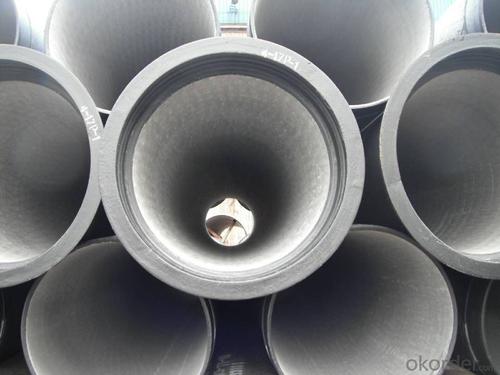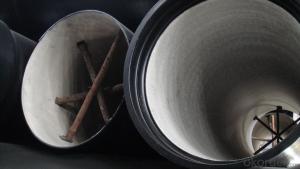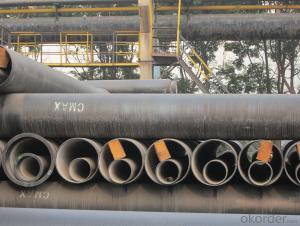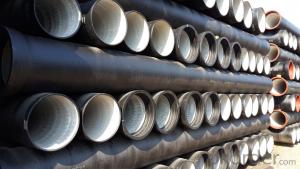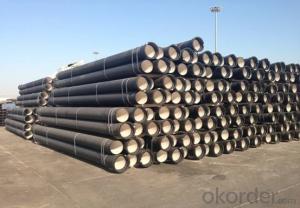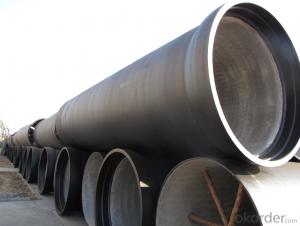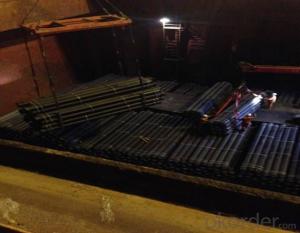DUCTILE IRON PIPE DN1400
- Loading Port:
- China Main Port
- Payment Terms:
- TT OR LC
- Min Order Qty:
- -
- Supply Capability:
- -
OKorder Service Pledge
OKorder Financial Service
You Might Also Like
Specification:
1) The standard of pipe: ISO2531:1998, K9
2) Effective length: 6m
3) Inner cement line: Portland cement line as per ISO4179
4) Zinc coating: at least 130g/m2 as per ISO8179
5) Bitumen painting: at least 70um as per ISO8179
6) With 100% quantity of NBR ring, or SBR ring, or EPDM ring as per ISO4633
7) DN80mm-800mm
8) High strength, lighter than grey iron, good corrosion resistance, no furring, small flow resistance, easy fixing, long life tome about 100 yeas
9) Produced by Hangzhou chunfeng machine
10) Checked by automatic inspection equipment
11) Composition:
Chemical composition | |||
Chemical composition | Ductile Cast Iron Pipe (%) | Grey iron pipe (%) | Steel pipe (%) |
C | 3.5-4.0 | 3.2-3.8 | 0.1-0.2 |
Si | 1.9-2.6 | 1.4-2.2 | 0.15-0.4 |
Mn | 0.15-0.45 | 0.4-0.6 | 0.3-0.6 |
P | ≤0.06 | ≤0.3 | 0.02-0.03 |
S | ≤0.02 | ≤0.1 | 0.02-0.03 |
Mg | 0.03-0.06 |
|
|
12) Feature:
Mechanical properties | |||
| Ductile Cast Iron Pipe | Grey Iron Pipe | Steel Pipe |
Tensile Strength(Mpa) | ≥420 | 150-260 | ≥400 |
Yield Strength(Mpa) | ≥300 | No Confirmation | No Confirmation |
Bending Strength(Mpa) | ≥590 | 200-360 | ≥400 |
Elongation (%) | ≥10 | Neglected | ≥18 |
Brinell Hardness(HBS) | ≤230 | ≤230 | About 140 |
13) T type mechanical joint
14) Packing: in bulk or container
- Q: Are ductile iron pipes resistant to root intrusion?
- Ductile iron pipes are generally resistant to root intrusion, but not entirely immune. While the material itself is strong and durable, root intrusion can still occur through any cracks, joints, or damaged sections of the pipe. It is important to note that root intrusion is more common in older or poorly maintained pipes, where cracks or gaps may develop over time. However, modern ductile iron pipes are often coated with protective layers or linings to minimize the risk of root intrusion. Additionally, regular inspection and maintenance can help detect and address any potential issues before they escalate.
- Q: Can ductile iron pipes be used in contaminated groundwater systems?
- Yes, ductile iron pipes can be used in contaminated groundwater systems. Ductile iron pipes are known for their corrosion resistance, making them suitable for handling water with various levels of contamination. Additionally, their strength and durability allow them to withstand the harsh conditions of contaminated groundwater systems.
- Q: What is the ductile cast iron pipe
- Have not heard of the nodular cast iron pipe pipe, ductile iron may be a tube or a certain short tube is referred to as excellent grade.
- Q: Do ductile iron pipes require internal linings or coatings?
- Ductile iron pipes do not typically require internal linings or coatings. Ductile iron is known for its inherent corrosion resistance, which is primarily due to its composition and microstructure. The iron in ductile iron pipes is treated with magnesium, resulting in the formation of graphite nodules that give the material its ductile properties. This microstructure also provides a protective layer on the surface of the pipe, which helps to prevent corrosion. Additionally, ductile iron pipes have been used for several decades without the need for internal linings or coatings, proving their durability and resistance to corrosion. The smooth interior surface of ductile iron pipes also helps to minimize friction and maintain efficient flow rates. However, in certain cases where the conveyed fluid is highly corrosive or abrasive, or if the water quality is aggressive, internal linings or coatings may be recommended. These linings or coatings can be applied to protect the pipe from chemical attack or to prevent the leaching of iron into the water supply. Ultimately, the decision to use internal linings or coatings on ductile iron pipes depends on various factors such as the specific application, water quality, and local regulations. Consulting with professionals in the field, such as engineers or pipe manufacturers, can provide more tailored advice for specific scenarios.
- Q: How does ductile iron pipe handle changes in pipe diameter or size?
- Ductile iron pipe is designed to handle changes in pipe diameter or size with relative ease. It possesses excellent flexibility and can accommodate variations in pipe dimensions without compromising its structural integrity. This is mainly due to its unique composition, which includes a significant amount of graphite nodules that provide ductility and elasticity to the material. When faced with changes in pipe diameter or size, ductile iron pipe can be easily manufactured or modified to meet specific requirements. It can be cast or fabricated in various diameters and lengths, allowing for seamless integration and adaptability within a pipeline system. This versatility is particularly beneficial in scenarios where different pipe sizes need to be connected or when the pipeline layout requires alterations. Moreover, ductile iron pipe's superior mechanical properties make it capable of withstanding the stresses and forces associated with changes in pipe diameter or size. It exhibits high tensile strength, impact resistance, and durability, ensuring that it can handle the internal and external pressures exerted on the pipe during operations. Additionally, the jointing systems used with ductile iron pipe contribute to its ability to handle changes in diameter or size. Various joint types, such as push-on, restrained, or mechanical joints, provide secure and leak-free connections between different pipe sections. These joints allow for easy assembly and disassembly, enabling efficient adjustments to the pipe diameter or size as needed. In conclusion, ductile iron pipe is well-equipped to handle changes in pipe diameter or size due to its inherent flexibility, adaptability, and robustness. Its composition, manufacturing capabilities, and jointing systems all contribute to its ability to accommodate variations in pipe dimensions without compromising its performance.
- Q: How are ductile iron pipes made?
- The manufacturing of ductile iron pipes involves a specific process called centrifugal casting. In this process, molten iron is poured into a rotating mold, typically made of steel. The rotation of the mold creates centrifugal force, which evenly distributes the molten iron, resulting in high-quality pipes. To start the manufacturing process, a mixture of scrap iron, steel, and recycled material is melted at extremely high temperatures in a furnace. Once the molten iron reaches the desired temperature and consistency, it is ready to be cast into pipes. To prevent the molten iron from cooling too quickly, the rotating mold is preheated. This preheating also contributes to achieving a smooth surface finish on the pipes. The molten iron is then poured into the rotating mold through a central sprue. As the mold spins, centrifugal force forces the molten iron against the inner walls of the mold. This rapid solidification results in dense, strong, and corrosion-resistant pipes. The centrifugal force also helps remove impurities or slag from the inner surface of the pipe, further enhancing its quality. Once the casting process is complete, the mold is allowed to cool, and the pipe is removed. The pipes undergo various tests to ensure they meet the required quality standards. These tests include checking dimensions, mechanical properties, and surface finish. After passing the quality tests, ductile iron pipes are typically coated with a protective lining to prevent corrosion and extend their lifespan. The type of lining used, such as cement mortar, epoxy, or polyethylene, depends on the intended application of the pipes. In conclusion, the centrifugal casting process is utilized to manufacture ductile iron pipes. This process ensures the production of high-quality pipes that are strong, corrosion-resistant, and have a smooth surface finish.
- Q: Can centrifugal cast iron pipe be galvanized or coated with asphalt which is good for corrosion prevention?
- By spraying zinc and epoxy coal tar coating of ductile iron pipe wall (or epoxy resin paint, polyurethane, etc.) wall using Portland cement (or epoxy powder, epoxy, polyurethane, ceramics etc.) wall coating can effectively active substances in soil and the formation of an insoluble zinc salt protection tube, the internal coating can inhibit corrosion of pipe body fluid medium.
- Q: Is there any cast iron pipe used in the fire hose?
- No, I think so. In theory, you can.See if the specifications have any requirements for the material.
- Q: Which is good for water polo cast iron pipe steel pipe?
- In summary, if the demand is not high, the use of stable environment, pressure and vibration is not a place recommend the use of ductile iron pipe; if is an important facility for high requirements or site conditions, abnormal conditions, vibration and impact may be relatively large, with ordinary seamless steel tube.
- Q: Is the ambient temperature at minus 20 degrees better with grey cast iron or ductile iron?
- Ductile iron castings have been used in almost all major industries. These departments require high strength, plasticity, toughness, wear resistance, and resistance to ductile iron
Send your message to us
DUCTILE IRON PIPE DN1400
- Loading Port:
- China Main Port
- Payment Terms:
- TT OR LC
- Min Order Qty:
- -
- Supply Capability:
- -
OKorder Service Pledge
OKorder Financial Service
Similar products
Hot products
Hot Searches
Related keywords




